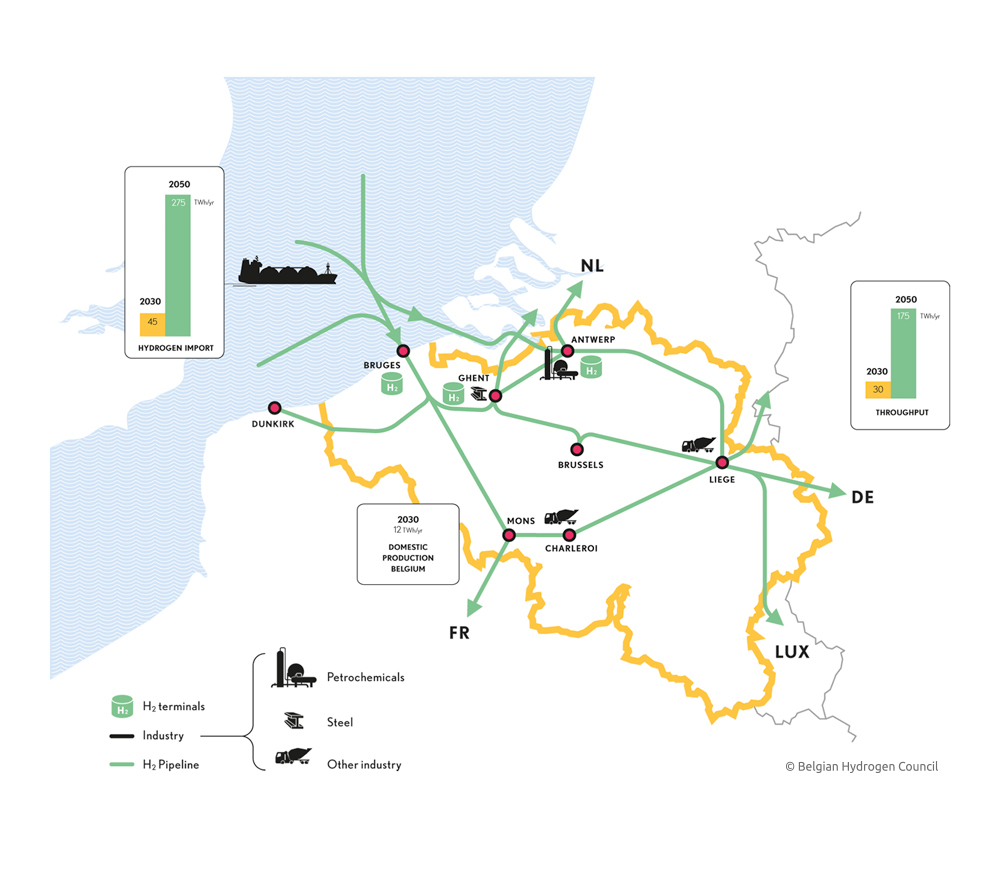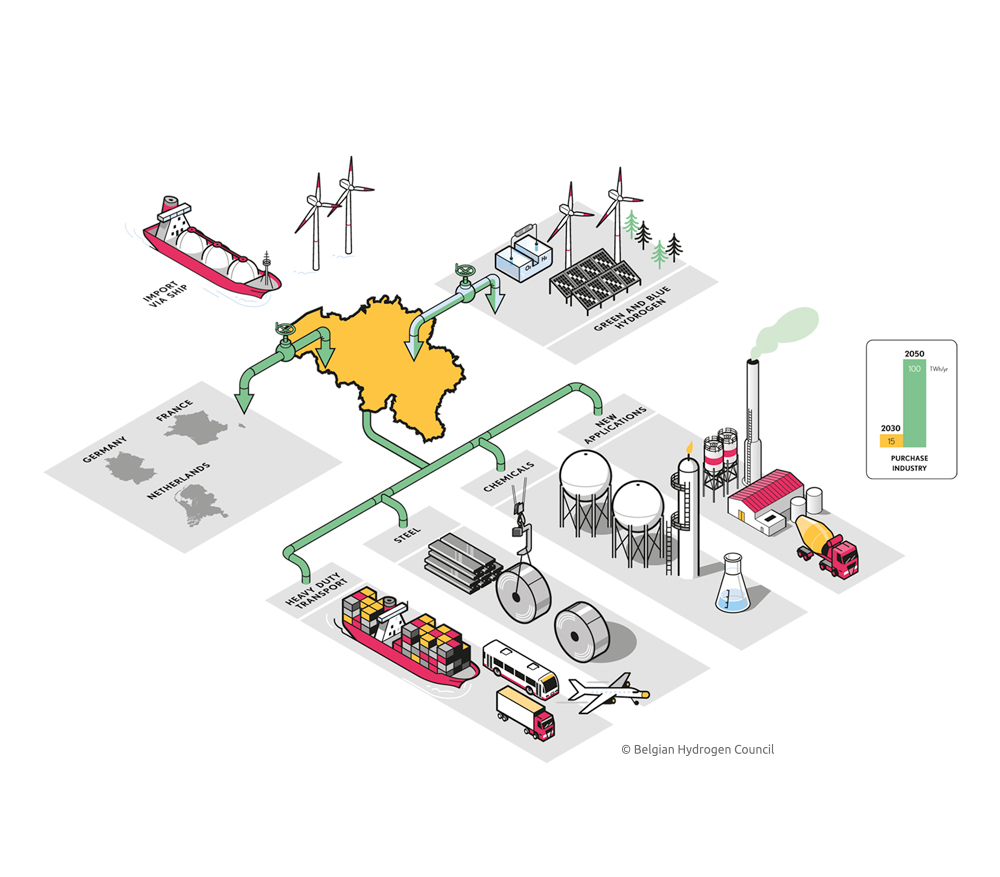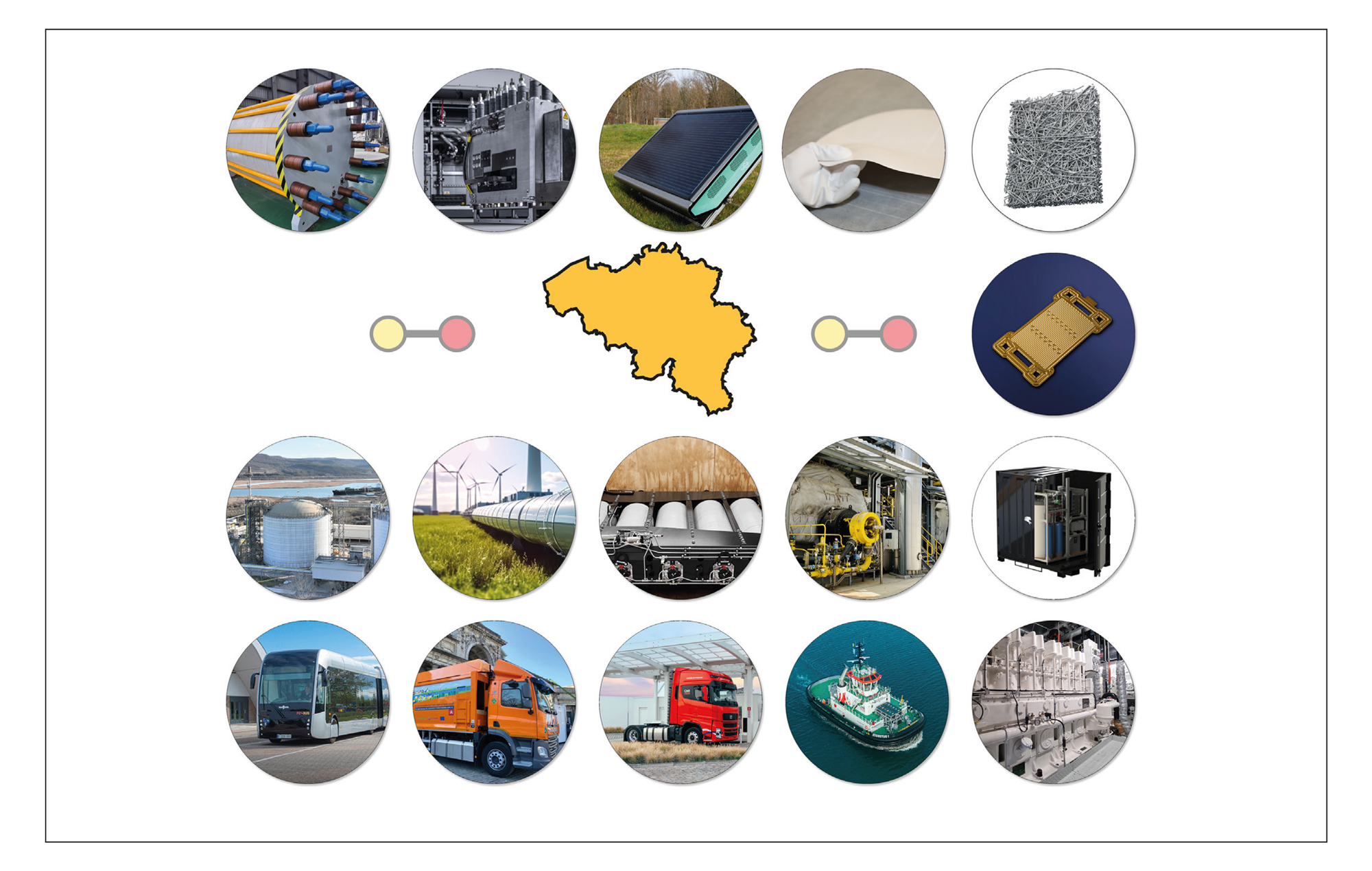Belgium has a lot to offer when it comes to hydrogen, despite its territory of only 30.528 km2. It has an extensive hydrogen and ammonia ecosystem, building on its ports, pipelines, import infrastructure and large industrial users, over several hydrogen technology champions supplemented with a strong hydrogen research base. Additionally, several Belgian companies are using their expertise for developing large scale hydrogen import value chains internationally.
Geographical and infrastructural assets
Belgium has four ports in a geographically very dense area, centrally located in Europe, that will play a major role in developing the future hydrogen economy in the EU. We have world leading shipping companies that are looking to ship hydrogen derivatives, such as ammonia and methanol, across the globe to our ports. Several terminals for the reception of these hydrogen carriers and cracking installations for the reconversion back to hydrogen, are under development in our ports.
Furthermore, besides already hosting the second largest existing hydrogen pipeline network that connects industrial clusters in France, Belgium and the Netherlands, an open-access hydrogen network is under development in Belgium.
This network will connect the different industrial clusters in Belgium, but also in the neighbouring regions, allowing our country to become a hub and gateway for the import & supply of renewable molecules for the rest of Europe, as we are already doing today for natural gas.


Large industrial consumers and innovative pioneering producers
Demand for clean hydrogen is set to peak in our region. A BENELUX study shows that Belgium could require up to 600 Kton of green hydrogen every year by 2030 (e.g. an increase of 100-200 Kton in just a couple of years). Our country is home to the second largest petrochemical cluster in the world. This cluster today already consumes between 400 and 500 Kton of hydrogen every year. This consumption will be decarbonised following the companies’ sustainability ambitions.
Furthermore, Belgian steel industry is looking at clean hydrogen to decarbonise by replacing fossil cokes. The steel sector can thus potentially become a large consumer of clean hydrogen. In Wallonia, cement, lime, glass and fertilizer companies are looking at clean hydrogen to reduce their CO2-footprint. In terms of heavy duty transport, Europe’s logistics hotspot is formed by the triangle between Europe’s largest seaports located in the Scheldt Delta and the Ruhr area, cantered on Europe’s largest fluvial port Duisburg. Nowhere in Europe the transport sector shows a higher concentration of heavy truck traffic, all looking at hydrogen to decarbonize the sector.
Made in Belgium: hydrogen technology champions
 Belgium has all assets to play a major role in the production technology. We host worldwide leading electrolyser manufacturers. We are also world leaders in producing state of the art and innovative components to make these electrolysers more efficient, cost effective and durable. Membranes, bipolar plates, catalysts, porous transport layers – all crucial components of an electrolyser – are already being researched, developed and manufactured in Belgium and significant scaling up of the production capacities is currently being implemented.
Belgium has all assets to play a major role in the production technology. We host worldwide leading electrolyser manufacturers. We are also world leaders in producing state of the art and innovative components to make these electrolysers more efficient, cost effective and durable. Membranes, bipolar plates, catalysts, porous transport layers – all crucial components of an electrolyser – are already being researched, developed and manufactured in Belgium and significant scaling up of the production capacities is currently being implemented.
Belgium has a tradition of several decades when it comes to combustion engines on hydrogen. Started at universities, now major industrial companies are accelerating developments on using hydrogen in combustion engines. These companies are now applying this technology in trucks, tugs, excavators and others appliances. Buses, garbage trucks, trucks, fuelled by hydrogen are being manufactured in Belgium and deployed in other European countries for years. To support the rollout of the hydrogen transport economy, our country already counts five operational public hydrogen refuelling stations, with two more in the pipeline.
Our knowledge institutes are also firmly committed to hydrogen with R&D activities, covering the whole value chain with research, development and techno-economic analysis. This includes a vast variety of advanced materials analysis and research throughout the entire hydrogen value chain of applications (including a.o. innovation and testing on pipelines and high pressure storage). New concepts are being developed e.g. for direct hydrogen production out of sun. On the other hand, new processes are investigated for implementing hydrogen in industries such as steel, chemicals and cement. Serving the transport sector, a lot of R&D is being done on e.g. engines on hydrogen and a drive-train for using hydrogen in heavy-duty mobility. And the portfolio is still growing while the hydrogen economy develops.
The Belgian strengths and ambitions regarding hydrogen are also reflected in the different published strategies: the federal H2 strategy , the Flemish H2 vision and the Walloon strategic plan for H2.
